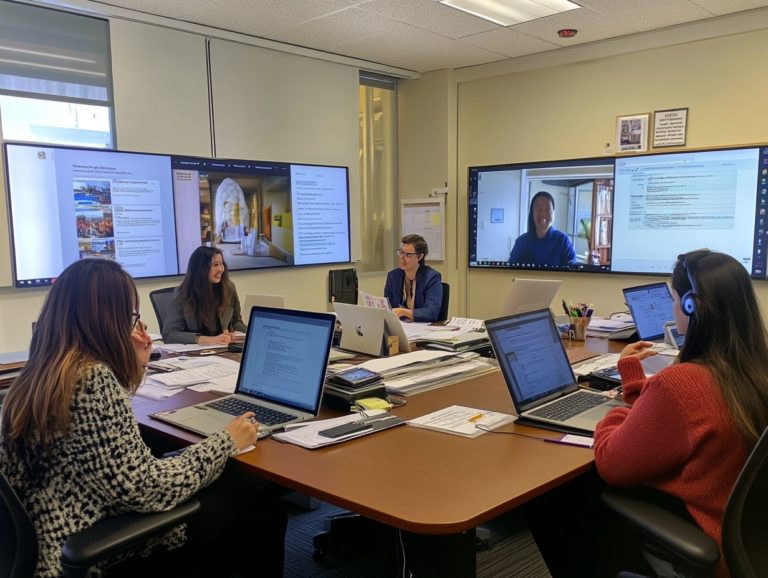How to Evaluate the Quality of an Online Course
In today’s digital landscape, online courses present a valuable opportunity for enhancing your education and skills.
However, not all courses are created equal. With a plethora of options at your fingertips, it s crucial to know how to assess their quality effectively.
This guide delves into the essential factors to consider like accreditation, course content, and instructor qualifications while also providing you with effective evaluation methods, such as reviews and course demos.
Discover the amazing benefits of choosing a high-quality online course, positioning yourself for both career advancement and personal growth.
Contents
- Key Takeaways:
- Factors to Consider When Evaluating Online Courses
- Methods for Evaluating Online Courses
- Benefits of Choosing a High-Quality Online Course
- Frequently Asked Questions
- What criteria should I consider when evaluating the quality of an online course?
- How can I determine if an online course is accredited?
- What role do student reviews play in evaluating the quality of an online course?
- Are there any specific red flags to look out for when evaluating the quality of an online course?
- What resources can I use to help me evaluate the quality of an online course?
- Is it recommended to try a free trial or sample of an online course before enrolling?
Key Takeaways:

- Accreditations and credibility should be the first factors to consider when evaluating an online course, as this ensures the course meets industry standards and will be recognized by potential employers.
- Course content and structure should be well-organized and engaging, with clear learning objectives and assessments to ensure a valuable learning experience.
- Researching the instructor’s qualifications and the institution’s reputation is crucial in determining the level of support and guidance students can expect throughout the course.
What are Online Courses?
Online courses offer a new way to learn from home, enabling you to pursue high-quality learning opportunities comfortably. Advanced educational technologies enhance your learning experience.
By utilizing web-based platforms, you can easily engage with instructors and peers, access a wealth of resources, and participate in interactive activities all designed to meet your diverse learning needs.
As the educational landscape evolves, online courses have become essential to modern instructional design. They provide flexible options that fit seamlessly into your busy schedule and lifestyle.
These courses cater to a global audience and enhance your satisfaction through personalized learning paths. With the freedom to access resources anytime and anywhere, you can dive deeply into content, collaborate on projects, and receive tailored feedback all crucial elements in creating a supportive learning community.
The emphasis on effective course design ensures that educational quality remains high while maximizing the potential of technology-based instruction.
Factors to Consider When Evaluating Online Courses
When evaluating online courses, consider several essential factors to ensure a quality learning experience that meets accreditation standards and fosters effective teaching.
Key factors to assess include:
- The course evaluation processes.
- The qualifications of the faculty.
- The availability of institutional resources that will support your learning journey.
Understanding the faculty-to-student ratios helps you gauge support and engagement as a learner.
Accreditation and Credibility
Accreditation and credibility are pivotal when evaluating online courses. They ensure that programs adhere to established quality standards set by reputable institutions, like California State University and others.
When you consider a course s accreditation status, you re not just looking at a badge of honor; you re gaining assurance that the education you receive has undergone rigorous quality review processes. This significantly influences your learning outcomes and future career prospects.
Different accrediting bodies focus on various aspects of education, such as regional, national, and programmatic accreditation, each playing a vital role in shaping the educational landscape.
As you explore accredited programs, weigh factors like the institution s reputation, faculty qualifications, and alignment with industry standards.
In a world increasingly dominated by educational technologies, accreditation becomes even more crucial. It ensures that online courses are not just valid but are also designed to deliver high-quality learning experiences.
The impact of accreditation on your online education journey is profound. It provides you with a clear roadmap to navigate your educational choices confidently, knowing that the programs you select are recognized and valued in the job market.
Start exploring your options today and choose the course that’s right for you!
Course Content and Structure
The content and structure of your online course are essential in shaping the learning experience. Effective course design directly influences student engagement and learning outcomes.
A well-crafted course syllabus, aligned with instructional design principles, ensures you know what to expect. It creates an interactive environment that actively involves you in your education.
Incorporating diverse instructional methods such as multimedia resources, quizzes, and discussion forums will significantly enhance how well it works. This variety meets different learning styles and fosters student collaboration, creating a vibrant community.
Clear learning outcomes lay the groundwork for assessment and content organization, guiding how instruction is delivered. Regular feedback helps you track your progress, reinforcing the connection between course objectives and your achievements.
Ultimately, a thoughtfully structured course promotes a deeper understanding and retention of knowledge, allowing you to thrive in your learning journey.
Instructor Qualifications and Support

Instructor qualifications play a pivotal role in shaping your experience in online courses. They directly impact both your satisfaction and overall learning journey.
Qualified instructors bring a wealth of essential knowledge and skills. They don’t just deliver content; they provide ongoing support that keeps you engaged and creates a positive learning environment.
Experienced educators elevate the quality of instruction, adeptly employing various teaching methodologies that cater to different learning styles.
This adaptability leads to improved performance and higher retention rates, underscoring the importance of educator expertise in the digital realm.
When you feel supported by instructors who understand the subject matter and communicate effectively, your satisfaction and motivation soar!
As online education evolves, the significance of qualified instructors in building robust support systems and nurturing enriching learning experiences is crucial.
Cost and Value
Assessing the cost and value of online courses is crucial for you as a prospective student. It helps you determine the best investment of your time and resources in quality educational opportunities.
By understanding the costs involved like tuition fees, technology access, and materials you can make informed decisions about your online education. These factors can vary significantly among institutions.
The perceived value of the education you receive plays a vital role in shaping your choices. When institutions invest in robust resources such as experienced faculty, interactive platforms, and comprehensive support services they elevate the overall learning experience and justify a higher price point.
Continuous improvements in curriculum design and teaching methodologies further enhance the value proposition. Engaging in thorough cost analysis is essential before committing to a specific program.
Methods for Evaluating Online Courses
To effectively evaluate online courses, you can employ various methods, including checking where to find reviews for online courses, which offer valuable insights into the quality and effectiveness of educational offerings.
Consider looking into course evaluations, reviews, and ratings from previous learners. Conducting thorough research on the institution, along with examining feedback from peers, will enable you to assess the overall reputation and reliability of the online education experience.
This approach equips you with the knowledge needed to make informed decisions that align with your exciting learning goals!
Reviews and Ratings
Reviews and ratings offer you valuable information into student satisfaction and the overall quality of online courses. They serve as essential tools for making informed decisions.
By looking into course evaluations and feedback from previous students, you can see what to expect and how effectively the course meets its learning outcomes. This feedback is important, encapsulating a range of experiences that highlight both the strengths and weaknesses of a course.
High ratings often indicate a well-structured curriculum alongside a supportive learning environment, both of which significantly influence student success.
You’ll find that potential learners can identify patterns in comments regarding instructor responsiveness, clarity of material, and the practical applications integrated throughout the course.
These reviews show how effective the course is and play a vital role in the continuous improvement of online educational offerings, guiding educators in their ongoing quest to better meet student needs.
Course Demos and Samples
Course demos and samples are valuable resources for you as a prospective student. They offer a sneak peek into the instructional design and learning experience of online courses.
By engaging with these demo materials, you can evaluate the quality of the course content and teaching methods before making a commitment. This essential step allows you to interact with the course’s layout, pacing, and delivery style, enabling you to make informed decisions that align with your personal learning preferences.
Evaluating these samples reveals how well the course meets your educational goals and needs. By observing the interactivity and engagement incorporated into the content, you can determine whether the course will provide a stimulating and supportive environment for your studies.
Ultimately, thorough course demonstrations play a critical role in enriching your online learning experience. It’s crucial for you to take full advantage of them before enrolling.
Researching the Institution

Researching the institution that offers online courses is a crucial step in your evaluation process. It allows you to assess the credibility and official recognition that underpin their educational programs.
Understanding the institution’s reputation in online education can greatly influence your decisions and expectations. By exploring various aspects such as faculty qualifications and institutional resources, you can gain valuable insights into the educational quality you can anticipate.
Investigating faculty credentials gives you a glimpse into the expertise and experience behind the coursework. Evaluating available resources like libraries and tech support provides a sense of the support network that will be available throughout your learning journey.
Understanding how institutions check and improve their courses helps clarify their commitment to maintaining high standards in online education. Don’t risk your education know who you’re learning from!
Benefits of Choosing a High-Quality Online Course
Choosing a high-quality online course opens doors! It enhances your career advancement opportunities, equips you with valuable knowledge and skills, and provides learning experiences tailored to various preferences.
Moreover, these top-tier courses often lead to substantial time and cost savings, enabling you to balance your educational pursuits with your other commitments more efficiently.
Career Advancement Opportunities
High-quality online courses present you with substantial career advancement opportunities by equipping you with the essential skills and knowledge needed to thrive in your chosen field.
Engaging in these programs can significantly enhance your professional development, helping you stand out in competitive job markets.
These courses not only deliver vital training in specific areas but also promote skill enhancement that is crucial for keeping up with industry demands.
They often cultivate valuable networking opportunities, allowing you to connect with peers, industry leaders, and mentors. Through collaborative projects and discussions, you can exchange ideas and gain insights that might be hard to come by in a traditional educational setting.
Moreover, many online courses enjoy recognition from industry authorities, which can add credibility to your resume and improve your prospects for promotions or salary increases.
Start your journey today choose the right course for you!
Increased Knowledge and Skills
Participar en cursos en l nea de alta calidad mejora significativamente tus conocimientos y habilidades. Estos programas suelen emplear tecnolog as educativas de vanguardia y metodolog as de dise o instruccional efectivas.
Al enfocarte en el contenido relevante del curso, puedes elevar tu experiencia en reas espec ficas. Estos cursos usan recursos multimedia interactivos y tecnolog as de aprendizaje que se adaptan a c mo aprendes mejor.
La integraci n de la gamificaci n y herramientas de simulaci n hace que el aprendizaje sea atractivo. Esto te empodera para aplicar conceptos te ricos en escenarios pr cticos.
Las evaluaciones bien estructuradas y los mecanismos de retroalimentaci n crean oportunidades valiosas para la auto-reflexi n. Esto te permite rastrear tu progreso de manera efectiva.
Como resultado, la combinaci n de tecnolog a y planificaci n estrat gica del curso fomenta un entorno que te ayuda a adquirir habilidades pr cticas y conocimientos integrales. Esto te prepara en ltima instancia para el xito en tu trayectoria profesional.
Time and Cost Savings
One of the standout benefits of high-quality online education lies in the remarkable time and cost savings it offers. This allows you to manage your studies effortlessly alongside your personal and professional commitments.
This flexibility enhances your overall learning experience. You can pursue your educational aspirations without the burden of substantial expenses.
By cutting out daily commutes to campuses, online courses grant you precious hours. You can redirect this time toward both your academic pursuits and personal growth.
Various formats like classes you can take anytime enable you to study at your own pace. This seamlessly integrates your learning schedule with work obligations and family priorities.
The financial advantages are equally appealing. With no travel costs, lower tuition fees, and reduced material expenses, you can save money while accessing amazing educational opportunities!
This efficient approach ensures that you can effectively balance life s demands while making meaningful progress in your studies.
Frequently Asked Questions

What criteria should I consider when evaluating the quality of an online course?
Some key factors include course content, instructor qualifications, interactive elements, technology used, and student support services.
How can I determine if an online course is accredited?
To check if a course is accredited, research the institution or program offering it and verify their accreditation status with a recognized accrediting agency.
What role do student reviews play in evaluating the quality of an online course?
Student reviews provide valuable insights into the effectiveness and satisfaction of an online course. Consider the source and number of reviews to gain a well-rounded understanding.
Are there any specific red flags to look out for when evaluating the quality of an online course?
Potential red flags include lack of accreditation, poor reviews or ratings, outdated content, and limited or nonexistent student support services.
What resources can I use to help me evaluate the quality of an online course?
Resources include online course review sites, accreditation databases, and feedback from current or former students.
Is it recommended to try a free trial or sample of an online course before enrolling?
Yes, trying a free trial or sample is recommended to get a better sense of the course content, instructional methods, and overall quality.






